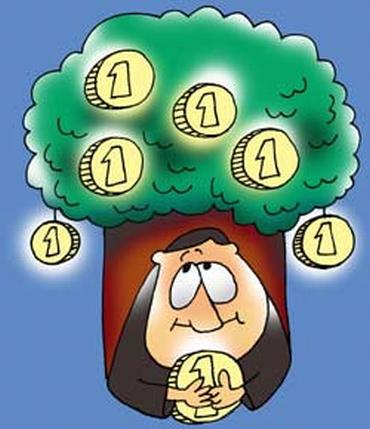 | « Back to article | Print this article |
Why Budget 2012 DISAPPOINTS the SALARIED class!
Salil Dhawan lists out the many disappointments that this year's Union Budget has for the salaried class of people.
The 2012 Union Budget came at a time when the ruling UPA coalition at the centre is facing multiple challenges from almost every quarter and the frustration of the masses is at its peak. While the single biggest disappointment was that promised DTC could not be fully implemented in the current fiscal, there is certainly a move towards its spirit in the new scheme of taxation.
Let's first look at key announcements in the budget which directly impacts salaried class:
In the Union Budget 2012-13, Finance Minister Pranab Mukherjee has given a marginal benefit on the much awaited income tax slabs.
The biggest beneficiaries would be people having income between Rs. 800,001 to 999,999 per annum. They move from the 30 per cent slab to the 20 per cent slab.
Courtesy: Investment-mantra.in
New income tax slabs
The basic slab for income tax has been proposed to be raised to Rs. 2 lakhs from the current Rs. 1.8 lakhs. This leads to a savings of Rs. 2,000 for all taxpayers earning between 180,001 to 199,999. The finance Minister has not mentioned the tax slabs for women and senior citizens in his Budget Speech so far but it is awaited.
In addition, the finance minister has created new tax slabs. If your income is between Rs. 200,001 and Rs. 500,000, your tax rate will be 10%. For people earning Rs. 500001 to Rs. 10,00,000 -- the tax rate will be 20 per cent and for people whose income is Rs. 10,00,001 and above the tax rate is 30 per cent.
Health Checkup: Rs 5k exemption
Invest in equity and get tax benefits
A new equity scheme called Rajiv Gandhi Equity Saving Scheme is being introduced to promote equity investments. The scheme will get income tax deduction, which will be purely applicable to the new retail investors who will invest directly into equity up to Rs. 50000, with a lock-in period of three years.
The investor's annual income should not exceed Rs. 1,000,000.
In order to ensure more participation from small towns in IPOs, the FM has announced that changes have been made in the IPO guidelines.
The exact guidelines have not been mentioned yet. However, this is expected to help the capital markets in the long-run.
Tax-free bonds
Save, earn interest, save again
Ease on education loan rates
Reduction in securities transaction tax
Higher excise duty
The finance Minister has announced 12 per cent excise duty on branded retail garments but it has been proposed that multi-brand shops are to be supported and the country can expect more number of malls and Super Malls in the future.
The price of luxury cars is expected to go up.
This will disappoint people who were planning for the prices to fall post budget. The customs duties on the silver and gold prices have gone up to 4 per cent from 2 per cent. This will make both gold and silver costlier than what they are today. However, the branded silver jewellery is fully exempted from excise duty.
The custom duty of LCD and LED panels has been exempted. In addition, the mobile phone parts are exempted from basic customs duty, which is expected to bring down the price of mobile phones.
Housing loans
The key disappointments
Let's now have a look at key budget 2012 disappointments for the salaried class:
The budget, which the salaried class was keeping much expectation, was an absolute disappointment. Let's look at key disappointments for salaried class from Budget 2012.
Marginal change in tax slabs:
The new tax slabs for salaried and employed classes have been raised by a marginal amount. There will no tax for income up to Rs. 2 lakhs as against the previous figure of Rs. 1.8 lakhs. This hike in the minimum income limit for exemption is far short of the expectation that the middle class had from this year's budget.
It is an established fact that the majority of lower middle class gets affected by the initial tax exemption limit. The figure of Rs 2 lakhs is unlikely to go down well with the masses. The tax rates for income between Rs 2 lakhs to Rs 5 lakhs is stipulated at 10 per cent this year and the income between Rs 5 lakhs to Rs. 10 lakhs is 20 per cent and the tax for income above Rs 10 lakhs is 30 per cent.
Given the fact that there has been a steady rise in the incomes as well as cost of living in the nation, a large number of people have now come into higher income brackets and are likely to be adversely affected by this scheme of taxation. Given the continued inflation there is very little real relief for the common man in this tax scheme. The expectations of a much higher level of tax relief have been shattered and this will directly impact the lifestyles and consumption patterns of the middle class.
There have been no changes in the rates of corporate taxes which will further add to the discontentment among the salaried class. Given the fact that the standing committee of parliament had recommended the initial exemption limit of be raised to Rs 3 lakhs and a further exemption on eligible investments of up to Rs 3.2 lakhs, there is likely to political uproar against this proposal.
However, as of now the majority of the salaried middle class who pay a significant portion of their hard-earned money as taxes have been left high and dry.
No additional tax exepmtion on tax free infrastructure bonds
Interest paid on home loans
Next big disappointment for salaried individual was unfulfilled expectation of increase in exemption of interest paid on loans borrowed for buying houses for self occupation which was currently restricted to Rs1,50,000 for the year. This limit was expected to be enhanced to Rs 3, 00,000 so as to bring additional relief to a salaried individual who has borrowed and invested in a residential house for self occupation.
Luxury items to cost more
The impact of the budget is that most luxury items, eating out, air travel, leisure activities to cost more. Service tax rates hiked from 10 per cent to 12 per cent. AC, Fridge, large cars, gold diamonds etc. that makes the part of the urban lifestyle is going to be dearer.
Customs duty on gold increased
Gold loans providers such as Muthoot Finance and Manappuram Finance Ltd (MNFL.NS) may see slower volume growth after basic customs duty on gold was doubled.
Conclusion:
With the big ticket reforms missing from the budget, budget disappointed most people at a time when country is battling slowing growth, high inflation and higher fiscal deficit. For salaried class, change of the minimum exemption for income tax from Rs.1,80,000 to near about Rs.3,00,000 not happening was a major disappointment. This was something which could have added to the disposable income of the salaried individual who is already battling high inflation for some time now.













